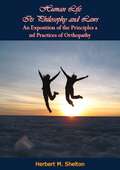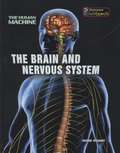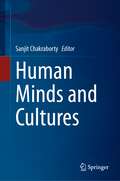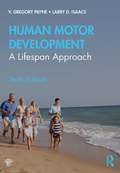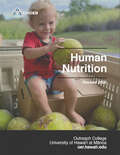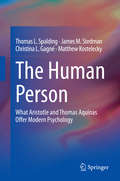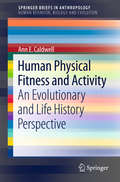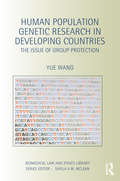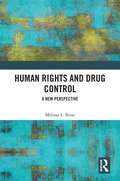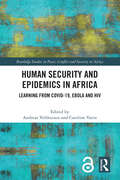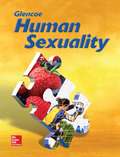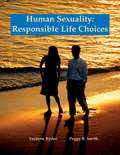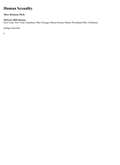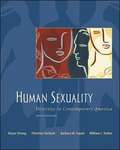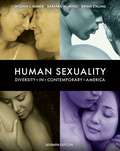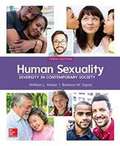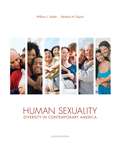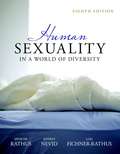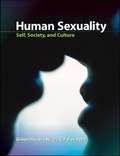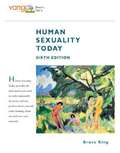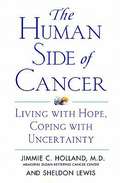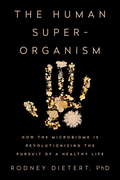- Table View
- List View
Human Life Its Philosophy and Laws: An Exposition of the Principles and Practices of Orthopathy
by Herbert M. SheltonThis book holds a unique place in the history of natural hygiene. It is a book for all times, all seasons, and all people. It was the first book to give detailed historical and practical credit to most all of the brilliant pioneers who were responsible for establishing the foundations for orthopathy. "Orthopathy" also called "Natural Hygiene," is an alternative medical philosophy derived from naturopathy. It advocates a vegetarian, raw food diet with periods of intermittent fasting. Contents: Health and Its Conditions and Requirements; The Laws of Life; Living Matter Cures Itself; Is Disease Friend or Foe; Early Orthopathic Ideas of Disease; Acute Disease a Curative Process; Self-Limited Disease; The Rational of Inflammation and Fever; Physiological Compensation; Acute Disease not a Radical Cure; Unity of Disease and Symptoms; Causes of Disease; Germs; Perversions; Feeding; Fasting; Sunshine and Sun-Baths; Physical Exercise; Hygiene of Health; Care of Wounds; Place of Art; Passing of the Plagues; Suppression of Disease and its Results.-Print ed.
The Human Machine: The Brain And Nervous System
by Richard SpilsburyWhat is a hypothalamus? How do reflexes work? Why is water important for a healthy brain? The Human Machine asks the questions that young people want answered. Each chapter contains a different question, so readers can develop their knowledge
Human Minds and Cultures
by Sanjit ChakrabortyThis book puts forward a harmonious analysis of similarities and differences between two concepts—human minds and cultures—and strives for a multicultural spectrum of philosophical explorations that could assist them in pondering the striking pursuit of envisaging human minds and cultures as an essential appraisal of philosophy and the social sciences. The book hinges on a theoretical understanding of the indispensable liaison between the dichotomy of minds and objectivity residing in semantic-ontological conjectures. The ethnographic sense of cultures confines the scope of cultural scientism, an evolutionary paradigm on the functionalist turn, where one could enthral the cultural phenomenon from the contentment of the conflict of scientific quandaries. Hence, cultural relativism concedes that cultures have some descriptive contents, like customs, beliefs, moral codes, other minds, etc., that are followed by an individual or a group of people. However, the notion of societalsemiotics embarks on the ‘semiotic conception of culture’ that deploys modernity and values centred on ethical conjectures. Human Minds and Cultures conspicuously attune the cultural edifice of moral minds and cope with the enduring prospects of ethics, genders, laws, and socio-political affairs. Essential reading for anyone with a sparkling interest in human minds and cultures.
Human Motor Development: A Lifespan Approach
by Greg Payne Larry IsaacsHuman Motor Development: A Lifespan Approach, 10th Edition, offers an overview to the study of changes in human movement across the lifespan. The book uses a holistic approach and emphasizes the importance of intellectual, social, and physical development and their impact on human motor development at all ages. The tenth edition has been completely revised and updated to reflect the most recent research and technology in human motor development. Organized into five parts, the book examines key topics in motor development including the relationship between cognitive and social development and motor development, factors affecting development, changes across the lifespan, and assessment in motor development. Highly illustrated and written for student accessibility, Human Motor Development: A Lifespan Approach is essential reading for students of motor control and development, kinesiology, human performance, and students interested in physical therapy, physical education, and exercise science. The book also provides access to a fully updated companion website, which includes laboratory exercises, an instructors’ manual, a test bank, and lecture slides.
Human Nutrition
by University of Hawai‘i at Mānoa Food ScienceThis textbook serves as an introduction to nutrition for undergraduate students and is the OER textbook for the FSHN 185 The Science of Human Nutrition course at the University of Hawai'i at Mānoa. The book covers basic concepts in human nutrition, key information about essential nutrients, basic nutritional assessment, and nutrition across the lifespan. <p><p>Revised 2022
The Human Person: What Aristotle and Thomas Aquinas Offer Modern Psychology
by Thomas L. Spalding James M. Stedman Christina L. Gagné Matthew KosteleckyThis book introduces the Aristotelian-Thomistic view of the human person to a contemporary audience, and reviews the ways in which this view could provide a philosophically sound foundation for modern psychology. The book presents the current state of psychology and offers critiques of the current philosophical foundations. In its presentation of the fundamental metaphysical commitments of the Aristotelian-Thomistic view, it places the human being within the broader understanding of the world. Chapters discuss the Aristotelian-Thomistic view of human and non-human cognition as well as the relationship between cognition and emotion. In addition, the book discusses the Aristotelian-Thomistic conception of human growth and development, including how the virtue theory relates to current psychological approaches to normal human development, the development of character problems that lead to psychopathology, current conceptions of positive psychology, and the place of the individual in the social world. The book ends with a summary of how Aristotelian-Thomistic theory relates to science in general and psychology in particular. The Human Person will be of interest to psychologists and cognitive scientists working within a number of subfields, including developmental psychology, social psychology, cognitive psychology, and clinical psychology, and to philosophers working on the philosophy of psychology, philosophy of mind, and the interaction between historical philosophy and contemporary science, as well as linguists and computer scientists interested in psychology of language and artificial intelligence.
Human Physical Fitness and Activity
by Ann E. CaldwellThe science of human physical activity and fitness is ripefor a novel theoretical framework that can integrate the ecological, genetic,physiological and psychological factors that influence physical activity inhumans. Physical inactivity dominates most developed nations around theworld, and is among the leading causes of disease burden and death worldwide. Despitethe wide array of physical and mental health benefits, few people get therecommended level of physical activity to achieve these benefits. Currentresearch on physical activity has not, as of yet, been successful for thedevelopment of effective exercise interventions. Several researchers haveadvocated a more integrative approach that takes evolutionary history intoaccount, but such a framework has yet to be advanced. To that aim, the firstgoal of this book is to present a comprehensive evolutionary and life historyframework that highlights the domain-specific aspects of the evolved psychologyand physiology that can lead to a more integrated and complete understanding ofphysical activity across the lifespan. It summarizes and extends previous workthat has been done to understand the ways natural selection has shaped physicalactivity in humans in traditional and modern economies and environments. In many ways, humans are adaptedto be physically active. Overall, however, natural selection has shaped aflexible, but energy conscious system that responds to environmental andindividual costs and benefits of physical activity to optimally allocate afinite energetic budget across the lifespan. This system is adapted to respondto cues of resource scarcity and high levels of obligatory physical activity, andconserves energy to favor allocation in ways that increase the likelihood ofreproductive success and survival. This nuanced application leads to a morethorough understanding of the circumstances that natural selection is predictedto favor both sedentary and active behaviors in predictable ways across thelifespan. The second goal of this book is to synthesizeand interpret cross-disciplinary research (from biological and evolutionaryanthropology and psychology; epidemiology; health psychology; and exercisephysiology) that can illuminate original approaches to increase physicalactivity in modern, primarily sedentary contexts. This includes a breakdown ofthe human lifespan to discuss the predicted costs and benefits of physicalactivity at each stage of life in order to differentiate the obstacles tophysical activity and exercise that are functionally adaptive--or were in theenvironments that they evolved--and identifying which factors are moremodifiable than others in order to develop interventions and environments thatare more conducive to physical activity. Normal 0 false false false EN-US JA X-NONE /* Style Definitions */ table. MsoNormalTable {{mso-style-name:"Table Normal"; mso-tstyle-rowband-size:0; mso-tstyle-colband-size:0; mso-style-noshow:yes; mso-style-priority:99; mso-style-parent:""; mso-padding-alt:0in 5. 4pt 0in 5. 4pt; mso-para-margin-top:0in; mso-para-margin-right:0in; mso-para-margin-bottom:10. 0pt; mso-para-margin-left:0in; line-height:115%; mso-pagination:widow-orphan; font-size:11. 0pt; font-family:"Calibri","sans-serif"; mso-ascii-font-family:Calibri; mso-ascii-theme-font:minor-latin; mso-hansi-font-family:Calibri; mso-hansi-theme-font:minor-latin; mso-bidi-font-family:"Times New Roman"; mso-bidi-theme-font:minor-bidi;}}
Human Population Genetic Research in Developing Countries: The Issue of Group Protection (Biomedical Law and Ethics Library)
by Yue WangHuman population genetic research (HPGR) seeks to identify the diversity and variation of the human genome and how human group and individual genetic diversity has developed. This book asks whether developing countries are well prepared for the ethical and legal conduct of human population genetic research, with specific regard to vulnerable target group protection. The book highlights particular issues raised by genetic research on populations as a whole, such as the potential harm specific groups may suffer in genetic research, and the capacity for current frameworks of Western developed countries to provide adequate protections for these target populations. Using The People’s Republic of China as a key example, Yue Wang argues that since the target groups of HPGR are almost always from isolated and rural areas of developing countries, the ethical and legal frameworks for human subject protection need to be reconsidered in order to eliminate, or at least reduce, the vulnerability of those groups. While most discussion in this field focuses on the impact of genetic research on individuals, this book breaks new ground in exploring how the interests of target groups are also seriously implicated in genetic work. In evaluating current regulations concerning prevention of harm to vulnerable groups, the book also puts forward an alternative model for group protection in the context of human population genetic research in developing countries. The book will be of great interest to students and academics of medical law, ethics, and the implications of genetic research.
Human Rights and Drug Control: A New Perspective
by Melissa L. BoneThis book uses a human rights perspective – developed philosophically, politically and legally – to change the way in which we think about drug control issues. The prohibitionist approach towards tackling the ‘drugs problem’ is not working. The laws and mentality that see drugs as the problem and tries to fight them, makes the ‘drugs problem’ worse. While the law is the best-placed mechanism to regulate our actions in relation to particular drugs, this book argues against the stranglehold of the criminal law, and instead presents a human rights perspective to change the way we think about drug control issues. Part I develops a conceptual framework for human rights in the context of drug control – philosophically, politically and legally – and applies this to the domestic (UK) and international drug control system. Part II focuses on case law to illustrate both the potential and the limitations of successfully applying this unique perspective in practice. The conclusion points towards a bottom-up process for drug policy which is capable of reconfiguring the mentality of prohibition. This book will be of interest to students and scholars of human rights, criminal law, criminology, politics and socio-legal studies.
Human Security and Epidemics in Africa: Learning from COVID-19, Ebola and HIV (Routledge Studies in Peace, Conflict and Security in Africa)
by Velthuizen, Edited by Andreas Caroline VarinThis book examines the impact of epidemics in Africa, exploring some of the adaptation and crisis management strategies adopted to tackle COVID-19, Ebola, and HIV-AIDS. The authors reflect on lessons learned from solving complex problems and difficult decisions made by leaders on pandemic management to shape the security environment and, thus, the well-being of people living in Africa for years to come.Drawing on cases from across the continent, the book demonstrates that, significantly, during the COVID-19 pandemic, African countries and communities frequently displayed regional solidarity, creativity in decision-making, decisiveness in dealing with corruption and opportunism, and resilience and discipline in implementation. Adopting a human security framework, the authors share their lived experiences and explore the impact of epidemics on public policy decision-making, foreign policy implementation, global relations, collaboration in the community dimension, and, ultimately, the future of socio-economic development in Africa.This book will be a welcome addition for practitioners and researchers across the fields of security studies, health management, and African studies, making an essential contribution to the security discourse in a post-COVID world.
Human Sexuality
by Mary BronsonHigh School sex education textbook contents: Sexuality and you Relationships and choosing abstinence The reproductive system Marriage and parenthood Pregnancy and childbirth Issues of sexuality Sexually transmitted diseases HIV and AIDS
Human Sexuality: Making Informed Decisions
by David Knox Mark A Whatley Caroline SchachtProvides an understanding of the human reproductive system, the various factors that influence the sexual decisions that every individual make and guides us to making the right sexual decision putting into consideration all the outcomes/consequences of every option. The book lets us know we have a deliberate choice to make in a relationship, a healthy choice for both the body and mind.
Human Sexuality: Responsible Life Choices
by Verdene Ryder Peggy B. SmithProvides teenage readers with basic information about sexual development and reproductive health. Chapters explain the sexual decision-making process and examine the outcomes and risks of sexual activity. Annotation c. by Book News, Inc., Portland, OR.
Human Sexuality: Diversity in Contemporary America 5th ed.
by Bryan Strong Christine Devault Barbara W. Sayad William L. YarberA non-judgmental introduction to human sexuality that features integration of ethnic, cultural, gender, and sexual orientation differences and similarities.
Human Sexuality: Diversity in Contemporary America (Seventh Edition)
by William L. Yarber Barbara J. Sayad Bryan StrongHuman Sexuality: Diversity in Contemporary America presents a forward thinking, open approach to Human Sexuality for today's student. The new lead authors, Bill Yarber and Barbara Sayad, continue to bring their research experience to the book while maintaining the engaging writing style that original author Bryan Strong brought to this best-selling text for years. The first text to achieve a full integration of cutting-edge research with a contemporary"sex-positive"approach, it also strives to represent the modern, diverse world that students encounter outside the classroom. Both within the text itself and throughout the exemplary art and photo program, the focus is on inclusion. Human Sexuality has been lauded by students and instructors alike for providing the most integrated and non-judgmental view of sexual orientation available. The seventh edition maintains these themes while adding a new contemporary design, streamlined format and significant content and feature revisions and updates.
Human Sexuality: Diversity In Contemporary Society
by William L Yarber Barbara W. SayadHuman Sexuality: Diversity in Contemporary Society continues to be a pioneering text in many ways. The sexual affirmation approach encourages students to become proactive in and about their own sexual well-being and includes an emphasis on the importance of embracing intimacy, pleasuring, and mutual satisfaction in sexual expression. It also strives to represent the contemporary, diverse society that students encounter inside and outside the classroom. <P><p>And with McGraw-Hill Education Connect for Human Sexuality, students embark on a personalized digital learning program, which allows them to study more effectively and efficiently. Each chapter contains multiple Think About It features that prompt students to think critically about topics in sexuality such as am I normal, the science of love, hooking up, what behaviors constitute having had sex, orgasm and pleasure, and how college students indicate and interpret consent to have sex. The Practically Speaking feature asks students to examine their own values and the ways they express their sexuality. Topics include sexual communication, effective condom use, having sex again after sexual assault, and a glossary on sex, gender, and gender variation terms. These features help students apply the concepts presented in the book to their own lives.
Human Sexuality: Diversity in Contemporary America (8th Edition)
by William Yarber Barbara Sayad Bryan StrongHuman Sexuality: Diversity in Contemporary America presents a forward thinking, open approach to Human Sexuality for today's student. The new lead authors, Bill Yarber and Barbara Sayad, continue to bring their research experience to the book while maintaining the engaging writing style that original author Bryan Strong brought to this best-selling text for years. The first text to achieve a full integration of cutting-edge research with a contemporary "sex-positive" approach, it also strives to represent the modern, diverse world that students encounter outside the classroom. Both within the text itself and throughout the exemplary art and photo program, the focus is on inclusion. Human Sexuality has been lauded by students and instructors alike for providing the most integrated and non-judgmental view of sexual orientation available. The eighth edition maintains these themes while adding a new contemporary design, streamlined format and significant content and feature revisions and updates.
Human Sexuality in a World of Diversity 5th ed.
by Lois Fichner-Rathus Jeffrey S. Nevid Spencer A. RathusDetailed discussion of human sexuality.
Human Sexuality in a World of Diversity (8th Edition)
by Spencer A. Rathus Jeffrey S. Nevid Lois Fichner-RathusHuman Sexuality in a World of Diversity, 8e examines the rich diversity found in human sexuality and helps students develop their own opinions by promoting critical thinking skills, personal sexual health awareness, and responsible decision-making. Firmly rooted in science, the text systematically encourages students to apply the research to their own lives.
Human Sexuality in a World of Diversity (Ninth Edition)
by Spencer A. Rathus Jeffrey S Nevid Lois Fichner-RathusHuman Sexuality in a World of Diversity, 9/e examines the rich diversity found in human sexuality. More significantly, the text places an emphasis on cultivating understanding in a world of increasing diversity through personal engagement. Students are encouraged to reflect upon their own beliefs and experiences throughout the text in order to foster a more personal and impactful learning experience. The text also helps students develop their own opinions by promoting critical thinking skills, personal sexual health awareness, and responsible decision-making.
Human Sexuality Self, Society, and Culture
by Gilbert Herdt Nicole Polen-PetitHuman Sexuality: Self, Society, and Culture offers a positive, thought-provoking, and holistic appraisal of the human sexual experience. It presents human sexuality and the research of sexual science in an objective, balanced way, and give students the knowledge and skills to think critically about sexuality.
Human Sexuality Today (6th Edition)
by Bruce M. KingThe sixth edition of Human Sexuality Today provides students with the information they need to make responsible decisions and helps them feel comfortable about themselves while learning about their sexuality.
The Human Side of Cancer
by Sheldon Lewis Jimmie HollandFor more than twenty years, Dr. Holland has pioneered the study of psychological problems of cancer patients and their families -- whom she calls "the real experts." In The Human Side of Cancer, she shares what she has learned from all of them about facing this life-threatening illness and what truly helps along the cancer journey. This book is the next best thing to sitting in Dr. Holland's office and talking with her about the uncertainty and anxiety elicited by this disease. And it is a book that inspires hope -- through stories of the simple courage of ordinary people confronting cancer.
The Human Superorganism: How the Microbiome Is Revolutionizing the Pursuit of a Healthy Life
by Rodney Dietert"Eyeopening... Fascinating... may presage a paradigm shift in medicine." --Kirkus Reviews (starred review)"Teeming with information and big ideas... Outstanding."--Booklist (starred review)The origin of asthma, autism, Alzheimer's, allergies, cancer, heart disease, obesity, and even some kinds of depression is now clear. Award-winning researcher on the microbiome, professor Rodney Dietert presents a new paradigm in human biology that has emerged in the midst of the ongoing global epidemic of noncommunicable diseases. The Human Superorganism makes a sweeping, paradigm-shifting argument. It demolishes two fundamental beliefs that have blinkered all medical thinking until very recently: 1) Humans are better off as pure organisms free of foreign microbes; and 2) the human genome is the key to future medical advances. The microorganisms that we have sought to eliminate have been there for centuries supporting our ancestors. They comprise as much as 90 percent of the cells in and on our bodies--a staggering percentage! More than a thousand species of them live inside us, on our skin, and on our very eyelashes. Yet we have now significantly reduced their power and in doing so have sparked an epidemic of noncommunicable diseases--which now account for 63 percent of all human deaths. Ultimately, this book is not just about microbes; it is about a different way to view humans. The story that Dietert tells of where the new biology comes from, how it works, and the ways in which it affects your life is fascinating, authoritative, and revolutionary. Dietert identifies foods that best serve you, the superorganism; not new fad foods but ancient foods that have made sense for millennia. He explains protective measures against unsafe chemicals and drugs. He offers an empowering self-care guide and the blueprint for a revolution in public health. We are not what we have been taught. Each of us is a superorganism. The best path to a healthy life is through recognizing that profound truth.From the Hardcover edition.
